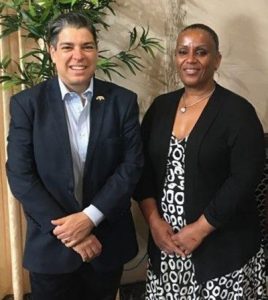City Government
Racial Profiling of African American Motorists Persists in Oakland

Racial profiling of African American motorists persists in Oakland despite the years of data-filled reports the Oakland Police Department (OPD) has been required to collect and the adoption of reforms suggested last year by Stanford researchers.
In a report on “Racial Inequities in Traffic Enforcement, Fees and Fines” to the City Council’s public Safety Committee Oct. 10, Deputy Police Chief Leronne Armstrong discussed the impact of federal court-mandated reforms on the persistent pattern of Black drivers being stopped by police or stopped and issued citations, far in excess of the percentage of the African American population in Oakland.
“We have seen the number of stops come down, (but) we have not seen a decrease in disparity as of yet,” said Armstrong.
The report found that in 2016, OPD conducted 25,355 traffic stops, of whom 15,082 or 62 percent were African Americans. Of those African Americans who were stopped, 5,818 or 39 percent received a citation.
Conversely, 61 percent of the motorists were stopped but not cited.
Latino motorists were 5,365 or 21 percent of the drivers who were stopped. Of those, 2,895 or 54 percent were cited.Whites, by contrast, had low numbers of traffic stops – 2,645 or 10 percent of the total stops, of whom 1,574 or 60 percent received citations.
2010 Census data indicates that 27.3 percent of the city’s population is Black, 25.4 percent Latino and 25.9 percent White.

Councilwomen Rebecca Kaplan (left) and Desley Brooks (right).
Councilmember Desley Brooks and Councilmember-at-Large Rebecca Kaplan raised serious concerns about the failure of OPD to make a dent in racial disparities.
“The report leads us to believe that data, data, data and more data will not solve this problem because we already have enough data to sink a ship,” said Councilmember Brooks, who chairs the Public Safety Committee.
“None of this has moved the needle,” she continued. “I’d like to focus the attention away from numbers to solutions… We’ve been studying this for at least 15 years now. We need to start getting to some real change.”
At issue is not only the excessive numbers of tickets that are issued but also the huge numbers of people who are stopped, she said.
“There is a problem when Africans American have 15,000 stops and only 5,000 were given citations. Something is wrong with that equation,” Brooks said.
“It is Latinos and African Americans who are most heavily impacted by this issue,” she said. People who potentially haven’t violated the law at all were stopped, and that’s problematic.”
Kaplan, who had requested OPD produce the report on inequities in traffic enforcement, said she was concerned about the economic impact of the fines on Oaklanders.
“African Americans are continuing to be subjected to disproportionate stops,” she said. “And while the report says Oakland is not receiving a large amount of the resulting fines, those people are still being subjected to huge amounts of resulting fines.
“The people who have to pay the fines are still suffering due to Oakland’s conduct.”
To reduce racial profiling, OPD has an ongoing collaboration with Stanford University researcher, which produced a report, “Strategies for Change – Research Initiatives and Recommendations to Improve Police-Community Relations in Oakland, Calif.”
The report, issued in June 2016, made 50 recommendations, 23 of which have been already implemented. All 50 are expected to be implemented by February 2018.
One of the changes is requiring officers to conduct stops based on “intelligence,” which means they should state a reason, have information, before conducting a stop.
“We want them to conduct stops based on intelligence,” said Deputy Chief Armstrong.
Before the reform was instituted, only 2 percent of traffic stops were based on intelligence. Now about 25 percent are, he said.
Mayor Libby Schaaf responded to a request for comment from the Oakland Post,
“I’m proud that the Oakland Police Department is the first department to allow a university to do a deep analysis of traffic stop data and our officers’ body-worn camera footage to help rebuild the community trust necessary to make Oakland a truly safe city,” said Mayor Schaaf. “I am committed to ending racial disparities in policing, and our partnership with Stanford is helping us get there.”
Activism
Oakland Post: Week of December 24 – 30, 2025
The printed Weekly Edition of the Oakland Post: Week of – December 24 – 30, 2025

To enlarge your view of this issue, use the slider, magnifying glass icon or full page icon in the lower right corner of the browser window.
Alameda County
Oakland Council Expands Citywide Security Cameras Despite Major Opposition
In a 7-1 vote in favor of the contract, with only District 3 Councilmember Carroll Fife voting no, the Council agreed to maintain its existing network of 291 cameras and add 40 new “pan-tilt-zoom cameras.”

By Post Staff
The Oakland City Council this week approved a $2.25 million contract with Flock Safety for a mass surveillance network of hundreds of security cameras to track vehicles in the city.
In a 7-1 vote in favor of the contract, with only District 3 Councilmember Carroll Fife voting no, the Council agreed to maintain its existing network of 291 cameras and add 40 new “pan-tilt-zoom cameras.”
In recent weeks hundreds of local residents have spoken against the camera system, raising concerns that data will be shared with immigration authorities and other federal agencies at a time when mass surveillance is growing across the country with little regard for individual rights.
The Flock network, supported by the Oakland Police Department, has the backing of residents and councilmembers who see it as an important tool to protect public safety.
“This system makes the Department more efficient as it allows for information related to disruptive/violent criminal activities to be captured … and allows for precise and focused enforcement,” OPD wrote in its proposal to City Council.
According to OPD, police made 232 arrests using data from Flock cameras between July 2024 and November of this year.
Based on the data, police say they recovered 68 guns, and utilizing the countywide system, they have found 1,100 stolen vehicles.
However, Flock’s cameras cast a wide net. The company’s cameras in Oakland last month captured license plate numbers and other information from about 1.4 million vehicles.
Speaking at Tuesday’s Council meeting, Fife was critical of her colleagues for signing a contract with a company that has been in the national spotlight for sharing data with federal agencies.
Flock’s cameras – which are automated license plate readers – have been used in tracking people who have had abortions, monitoring protesters, and aiding in deportation roundups.
“I don’t know how we get up and have several press conferences talking about how we are supportive of a sanctuary city status but then use a vendor that has been shown to have a direct relationship with (the U.S.) Border Control,” she said. “It doesn’t make sense to me.”
Several councilmembers who voted in favor of the contract said they supported the deal as long as some safeguards were written into the Council’s resolution.
“We’re not aiming for perfection,” said District 1 Councilmember Zac Unger. “This is not Orwellian facial recognition technology — that’s prohibited in Oakland. The road forward here is to add as many amendments as we can.”
Amendments passed by the Council prohibit OPD from sharing camera data with any other agencies for the purpose of “criminalizing reproductive or gender affirming healthcare” or for federal immigration enforcement. California state law also prohibits the sharing of license plate reader data with the federal government, and because Oakland’s sanctuary city status, OPD is not allowed to cooperate with immigration authorities.
A former member of Oakland’s Privacy Advisory Commission has sued OPD, alleging that it has violated its own rules around data sharing.
So far, OPD has shared Flock data with 50 other law enforcement agencies.
Activism
Black Arts Movement Business District Named New Cultural District in California
Located in the heart of District 3, the BAMBD is widely regarded as one of the nation’s most important centers of Black cultural production — a space where artists, entrepreneurs, organizers, and cultural workers have shaped generations of local and national identity. The state’s recognition affirms the district’s historic importance and its future promise.

By Post Staff
Oakland’s Black Arts Movement Business District (BAMBD) has been selected as one of California’s 10 new state-designated Cultural Districts, a distinction awarded by the California Arts Council (CAC), according to a media statement released by Councilmember Carroll Fife.
The BAMBD now joins 23 other districts across the state recognized for their deep cultural legacy, artistic excellence, and contributions to California’s creative economy.
Located in the heart of District 3, the BAMBD is widely regarded as one of the nation’s most important centers of Black cultural production — a space where artists, entrepreneurs, organizers, and cultural workers have shaped generations of local and national identity. The state’s recognition affirms the district’s historic importance and its future promise.
“This designation is a testament to what Black Oakland has built — and what we continue to build when we insist on investing in our own cultural and economic power,” said Fife.
“For years, our community has fought for meaningful recognition and resources for the Black Arts Movement Business District,” she said. “This announcement validates that work and ensures that BAMBD receives the support it needs to grow, thrive, and continue shaping the cultural fabric of California.”
Since taking office, Fife has led and supported multiple initiatives that strengthened the groundwork for this achievement, including:
- Restoring and protecting arts and cultural staffing within the City of Oakland.
- Creating the West Oakland Community Fund to reinvest in historically excluded communities
- Advancing a Black New Deal study to expand economic opportunity for Black Oakland
- Ensuring racial equity impact analyses for development proposals, improving access for Black businesses and Black contractors
- Introduced legislation and budget amendments that formalized, protected, and expanded the BAMBD
“These efforts weren’t abstract,” Fife said. “They were intentional, coordinated, and rooted in a belief that Black arts and Black businesses deserve deep, sustained public investment.”
As part of the Cultural District designation, BAMBD will receive:
- $10,000 over two years
- Dedicated technical assistance
- Statewide marketing and branding support
- Official designation from Jan. 1, 2026, through Dec. 31, 2030
This support will elevate the visibility of BAMBD’s artists, cultural organizations, small businesses, and legacy institutions, while helping attract new investment to the district.
“The BAMBD has always been more than a district,” Fife continued. “This recognition by the State of California gives us another tool in the fight to preserve Black culture, build Black economic power, and protect the families and institutions that make Oakland strong.”
For questions, contact Councilmember Carroll Fife at CFife@oaklandca.gov.
-

 #NNPA BlackPress4 weeks ago
#NNPA BlackPress4 weeks agoLIHEAP Funds Released After Weeks of Delay as States and the District Rush to Protect Households from the Cold
-

 Activism4 weeks ago
Activism4 weeks agoOakland Post: Week of November 26 – December 2, 2025
-

 Alameda County3 weeks ago
Alameda County3 weeks agoSeth Curry Makes Impressive Debut with the Golden State Warriors
-

 #NNPA BlackPress4 weeks ago
#NNPA BlackPress4 weeks agoSeven Steps to Help Your Child Build Meaningful Connections
-

 #NNPA BlackPress4 weeks ago
#NNPA BlackPress4 weeks agoSeven Steps to Help Your Child Build Meaningful Connections
-

 #NNPA BlackPress4 weeks ago
#NNPA BlackPress4 weeks agoTrinidad and Tobago – Prime Minister Confirms U.S. Marines Working on Tobago Radar System
-

 #NNPA BlackPress4 weeks ago
#NNPA BlackPress4 weeks agoThanksgiving Celebrated Across the Tri-State
-

 #NNPA BlackPress4 weeks ago
#NNPA BlackPress4 weeks agoTeens Reject Today’s News as Trump Intensifies His Assault on the Press






















































